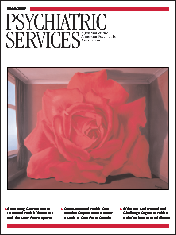Incentive Payments for Attendance at Appointments for Depression Among Low-Income African Americans
Abstract
OBJECTIVE: The purpose of this study was to evaluate the effect of nominal incentive payments on attendance at therapy appointments among 50 low-income African Americans with depression. METHODS: Attendance at therapy appointments for depression without incentive was tracked for 12 weeks, followed by tracking of 12 weeks during which $10 payments were given at regular appointments and a third 12-week period of appointments without payments. RESULTS: After adjustment for rescheduling, 54 percent of patients had better adherence when payments were attached to appointments, and an additional 14 percent continued with perfect attendance throughout this second period. In the third period, when payments were no longer made, 66 percent had a decline in adherence. Less rescheduling was also observed during the incentive period. CONCLUSION: Incentive payments have the potential to improve appointment adherence among low-income African Americans with depression.



